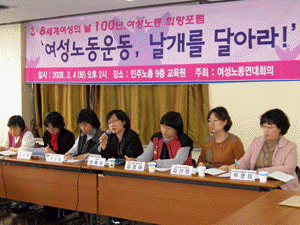About 110 participants from 16 countries participated in the workshop. On the first day country reports were presented, where participants shared about their country's migrant workers situation and policies. On the second day, there was input and discussion on Globalisation, Economic Restructuring and labor Migration.
There was also a panel discussion in order to hear about the experiences and responses to migrant workers' problems from the point of view of a receiving country (JCMK), a sending country (Philippines), and from a regional level (Migrant Forum in Asia). This was followed by an open forum. The final day's program involved the preparation of the following statement.
We recognise that in Asia alone, there are an estimated 15 million migrant workers (documented and undocumented). Women migrant workers constitute an increasing percentage of these. Economic, political, socio-cultural and religious marginalisation characterise the plight of migrant workers.
Would domination and control by advanced capitalist interests through structural adjustment, liberalisation and deregulation programmes of the International Monetary Fund, World Bank, and World Trade Organization, abetted by the collusion of governments, have resulted in poverty, unemployment and underemployment, unequal distribution of wealth within and among nations, collapse of agriculture, and the absence of peace and security in countries within the region.
Advocates of globalisation argue that it hastens the transfer of skills and technology and enhances productivity and efficiency. The reality is, globalisation of economies reinforces the control of advanced capitalists interests on the less developed countries, leading to the continued marginalisation, if not disintegration, of economic and socio-cultural systems in many countries in the South.
Globalisation requires the removal of trade and investment barriers to facilitate the movement of capital, investments, goods and labor across national borders. At the same time, advanced capitalist countries like the U.S. and Japan adopt protectionist policies.
We are gravely concerned that globalisation is leading to profit-driven economies that thrive on cheap and docile labor, especially of women, and societies that stress consumerism and competition.
In turn, these have resulted in the erosion of human values, commodification of people (especially migrant workers), disintegration of societies, families and communities, racism, xenophobia, unsustainable lifestyles, and the degradation of the environment. Demand for cheap labor has led to subcontracting mechanisms, adoption of "trainee" schemes and increasing feminisation of migrant labor.
This translates into absence of accountability of companies especially transnational corporations (TNCs), unjust wage structures, absence of economic and social security, and violence against women and migrants. The migrant workers, uprooted from their families and communities, have to work under hostile, abusive and exploitative situations, and are generally denied their right to organise and unionise.
We recognise the fact that migrant workers, whether documented or undocumented, have rights as workers and as human beings as embodied in the Universal Declaration of Human Rights, the UN Convention on the Protection of the Rights of All Migrant Workers and Members of their Families, and other international conventions.
Initiatives have been taken by migrants and support groups in both sending and receiving countries in the areas of assistance to migrants, advocacy, lobbying, campaigning, networking, documentation/ information and research.
The challenge to migrant workers, support groups and the people is great. Globalisation gives rise to increasingly complex processes and situations. The relentless drive of the capitalists to pursue globalisation, and the governments' abdication of their responsibility to the people, make our tasks even greater. We boldly face this challenge.
-
We advocate cooperation among peoples and social systems which are empowering, people-oriented, and which promote sustainable life and holistic, integral human values.
- We reject the existing model of development promoted by the IMF, WB, GATT/WTO and TNCs.
- We reject APEC and similar free trade and investment mechanisms or agreements.
- We hold governments accountable in providing decent employment for the people, and responsible for abetting the forces of globalisation.
-
Intensify the migrants' campaign against globalisation and APEC.
Strengthen and support the current lobbying and campaign initiatives for the ratification of the UN Convention for the Protection of the Rights of All Migrant Workers and Members of their Families.
Continue and strengthen the migrant action alert mechanism to expose blatant violations of migrants' human rights (e.g. through the Migrant Forum in Asia).
Undertake gender-sensitisation especially among migrants' advocates.
Conduct a regional campaign on the issue of violence against women migrant workers.
Declare a 'Migrant Workers' Day' every year for joint actions and education programmes across the region.
Encourage trade unions in sending and receiving countries to build linkages on migrants' concerns.
Develop disseminate and share education materials(manuals, etc) on globalisation and migrants' issues.
Work towards a common documentation system (basic data, migrants' rights violations, migrants' directory, etc).
Pressure governments to provide decent employment to the people, and encourage and monitor its efforts to undertake re-integration initiatives.
Organise migrants' savings/investment groups and alternative livelihood.
Integrate the recommendations of this conference in our respective organisational programmes.
1996 in Seoul, Korea.







